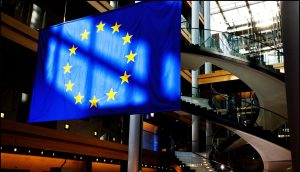European Union
Facts & Figures
AC member since
Active Polar Icebreakers
None but EU-funded Arctic Research Icebreaker Consortium (ARICE)
- History
- Arctic Policy
- Recent Publications
- Links
- Experts
The Arctic has only been of little importance for the European Union (EU) and its predecessor, the European Economic Community (EEC). This was particularly the case once Greenland withdrew from the EEC on 1 February 1985. And even although the EU’s Arctic presence was strengthened during the 1990s, among others by the establishment of the Barents Euro-Arctic Council, the accession to the EU of Finland and Sweden in 1995 and the related implementation of the Northern Dimension, EUrope did not show a particular Arctic interest at the turn of the millennium. Despite its link to the Barents region it was particularly the Northern Dimension that proved to be unsuccessful in engaging Arctic affairs and increasing regional awareness in Brussels. However, the return of a geopolitical Arctic in 2006/07 also directed the EU’s attention to the region. An area that – to some extent – already was EUropean; ever since Finland and Sweden joined the EU and European Economic Area (EEA) introduced a European single market area, also applicable to Iceland and Norway.
And yet, over the last decade, the European Union Arctic endeavour was the source of much Arctic controversy. Often perceived as an ‘external Arctic actor’, the EU has had difficulties proving its regional legitimacy and credibility to all Arctic states. However, despite much debate on the its role in the Arctic, the EU holds a strong, multidimensional regional presence. This includes its regulatory and research footprint, a proven impact on the Arctic’s climate, its role as key trade partner for all Arctic states and its participation in regional regimes. The European Union is part of the Arctic, linked to the Arctic and simultaneously affects and is affected by the Arctic.
Three EU member states – Denmark, Finland and Sweden – are also member states to the Arctic Council. The European Union maintains close relationships with three other Arctic states/entities – Greenland, Iceland and Norway – either via the EEA or the association of Overseas Countries and Territories (OCTs). The EU and its Commission, respectively, are members of the Barents Euro-Arctic Council, and party to UNCLOS and all its connected agreements with direct or indirect Arctic relevance. And by virtue of its member states, the European Union is represented at the Arctic Council either via the Arctic Council member states, Denmark, Finland, and Sweden, or its observers, France, Germany, Italy, Poland, the Netherlands, and Spain.
This page was updated on 1 August 2022. If we have missed anything, please contact info@thearcticinstitute.org.


